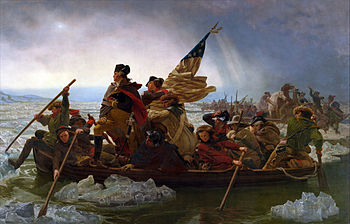
By Nancy Spannaus
November 8, 2025—Historian Richard Bell of the University of Maryland took up a critical topic on November 4, when he introduced his new book, The American Revolution and the Fate of the World, to the audience gathered by the American Revolution Institute of the Society of the Cincinnati in Washington, D.C. The American Revolution has to be understood in its global context, he argued, since its impact reached every corner of the world. It created a “geopolitical earthquake,” a “global convulsion” which shook world developments for the centuries that followed.

Bell, a naturalized American citizen who was born in Great Britain, has seen misrepresentations of the American Revolution from both sides of the Atlantic. His history classes in Britain essentially ignored the embarrassing event, preferring to jump from the glories of the Tudor Age to Britain’s role in defeating the Germans in World War I and II. But here in the United States, he found that there is an equally narrow view of the Revolutionary War, one which tends to limit it to the myth of rugged farmers singlehandedly taking on and defeating the greatest Empire in the world (with perhaps a few nods to the role of General Lafayette).
Bell’s book counters this narrative primarily through the stories of several disparate characters from the time, including Black loyalist John Mosely, Native American Molly Brant, Prussian General Baron von Steuben, privateer William Russell, escaped slave Harry Washington, and Peggy Shippen, loyalist wife of Benedict Arnold. Their lives shine a light on the impact of the War on places as far away from the United States as Australia and India, and show how it upended the lives of millions around the world for the better and for the worse.[1]
“Catastrophe?”
After monitoring Dr. Bell’s talk, I read the opening section of his book (available free on Amazon), which was very similar to his talk. His emphasis on the international participation in the Americans’ victory in the war is indeed a much-needed antidote to the popular version of our history, as I recently pointed out in my post on Who Helped Us Win Our War for Independence? However, both his mode of presentation (through individuals) and his emphasis on the backlash from the American victory suggest that Bell is following the disturbing contemporary trend of treating the Revolution as a “catastrophe.”
Granted, as I point out in my book From Subject to Citizen, there is a big difference between the Revolutionary War and the Revolution itself. The war, like all wars, did bring catastrophes, especially after the French and Spanish entered the conflict officially. But the Revolution — which encompasses the ideas of the Declaration, the establishment of self-government, and an economy based on serving the general welfare — had a longer-lasting effect, sowing the seeds of anti-imperialism, the overthrow of slavery, and technological revolutions for the betterment of all mankind. It is possible to trace that positive impact from the American Revolution, and as far as I can see, Bell’s book declines to do so.
Seven Big Arguments
In addition to his biographical sketches (which Bell explained were based on the work of others), Dr. Bell said his book puts forward seven big arguments about the Revolution.
First, the war stirred unprecedented mass migration globally. Bell is referring to the movement of armies as well as refugees.
Second, the human cost of the war was catastrophic for many who were caught up in it.
Third, the American victory was not inevitable, but depended upon a number of improbable events and improvisations.
Fourth, naval power was just as important as the land war in determining the outcome.
Fifth, the parties to the conflict often worked from the assumption that the control of trade represented power.
Sixth, the American patriots’ battle led to an intensified crackdown by the imperial authorities where they still had control – such as in India, South America, etc. In fact, Bell claimed that the British Empire itself ended up stronger after shedding the American colonies.
And seventh, the conflict led to the call for liberty ringing around the world as never before.
What’s the Big Idea?
Most of Bell’s arguments are true. But, useful as Dr. Bell’s book is in describing the international involvement and repercussions from the American Revolutionary War, it seems to me that it suffers from a major crucial omission. Amid the chronicling of mostly negative effects of the war, the book never identifies the world-historical significance of the Revolution itself.

The American Revolution brought into being a new kind of government, one never before established on this earth. It was a self-conscious republic, formally dedicated to the general welfare and happiness of its population, chosen with the participation of its population, and committed to the constant improvement of its people and their posterity. Its ideals, still not fully achieved, stand as a reminder of our destination as a nation.
Abraham Lincoln put it this way:
They [authors of the Declaration-ed.] meant to set up a standard maxim for free society which should be familiar to all: constantly looked to, constantly labored for, and even though never perfectly attained, constantly approximated, and thereby constantly spreading and deepening its influence and augmenting he happiness and value of life to all people, of all colors, everywhere.[2]
Our Founding Fathers were quite aware of their shortcomings, but also their uniqueness. No other national government featured the liberties and right to participation that the new American government did. This reality was also broadly recognized by people all around the world, as shown by their flocking to our shores, copying our forms of government, and seeking our assistance in overthrowing various despotic regimes.
Was such adoption of the American ideas of freedom followed by murderous crackdowns by the imperial rulers of the world? Of course it was, and that brought misery to many. But are we so craven as to argue that the fight for freedom should not be waged because it will lead to a backlash? Do we blame the Constitutional amendment banning slavery for the rise of the KKK? Of course not.

The “American experiment,” as our Revolution was often called, traveled a rocky road after the Revolutionary War was over, especially until the Union triumphed in the Civil War. But at that time, we Americans, with the help of good-hearted republicans internationally, demonstrated the viability of a republican government dedicated to ideals of the Declaration and the Constitution. That is how our Revolution fundamentally affected the fate of the world – and it was definitely for the better.
The fact that such a positive future is threatened today does not erase that reality. It should only spur us to greater efforts to improve our republic today.
[1] This genre of history – which concentrates on individual lives, often to the exclusion of the social process and the development of ideas – seems to be the most popular these days. As one publisher told me when I submitted my manuscript on Defeating Slavery, companies aren’t publishing “big idea” books these days.
[2] The excerpt is from Lincoln’s debate with Stephen Douglas in Alton, Illinois on Oct. 25, 1858.
Related Posts
Tags: American Revolution, Nancy Spannaus, republic, Richard Bell, Society of the Cincinnati










